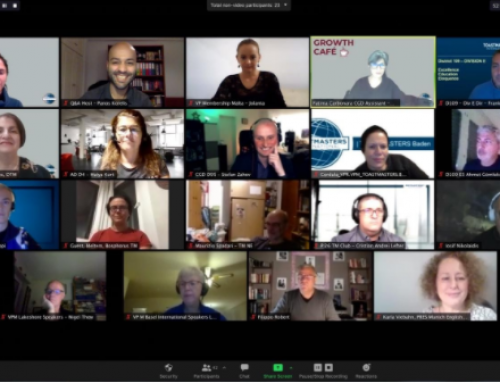The First Mentoring Meeting: The Goals and the Plans
Busy Toastmasters Guide to Mentoring. (Part V)
The First Mentoring Meeting: The Goals and the Plans – In the rest of the first meeting, I asked the Mentee about the goal they want to achieve in Toastmasters in general – and the goal they want to accomplish by the end of our mentoring relationship. This is much more than small talk.
At the end of December, I had a free coaching session with a friend (let’s call her Ivana). She is doing her coaching certification and needed someone to clock a couple of “coaching hours” with. Without expecting anything much, I agreed. She did not do anything magical with me, but she asked me questions about my goals for an hour and walked me through a couple of exercises. For most of that hour, I talked to her about my goals.
I consider myself a personal development geek. This year, I will celebrate my 10th anniversary with Toastmasters. I know the value of coaching. And yet, I haven’t spoken about my goals in such depth with someone for years.
Just by asking a couple of questions, Ivana allowed me to clarify my thinking. She helped me name the obstacles I saw in achieving them. And then set actions to overcome them.
Again, She didn’t do any magic. Most of the time, she just listened. I’m sure you can do that too.
Before the end of the meeting, after you’ve had the informal conversation about your Mentee’s goals, I propose you give your Mentee an assignment:
- Write the goal in Toastmasters
- Write the goal for the duration of your mentoring – and make it measurable
- Set a progress checkpoint for each month so that you can evaluate the progress at every future mentoring meeting.
They don’t need to worry about making it too precise. You will discuss this further. But it’s a good idea for your Mentee to start thinking about what they want to achieve.
For all future meetings, you may want to refer to these three points and discuss them with your Mentee:
- Whether and how any of the goals/checkpoints have changed
- What progress has your Mentee made towards achieving them
- What actions are needed to achieve them
What to do with your Mentee?
One way to do the mentoring is to keep the distance, meet your Mentee once a month over a cup of coffee (Or a glass of schnaps? Depending on your local meeting culture!), and talk about your Mentee’s progress towards their goals.
If you want to, however, you can make it much more hands-on. My first mentor, Georgi, invited me to join his contest practice – he had a speech prepared and gave it in an empty classroom, recording on a camera. Even though I was not competing, I recorded my speech rehearsal. We exchanged feedback, worked on our speeches more, and then gave our speech again.
With my first Mentee, we met in a park and practiced Table Topics. We prepared 5 Table Topic questions and took turns answering them. Since we were just two, we were done in less than 30 minutes. Compare it to how long it takes to give 5 Table Topics when doing them only in meetings!
One of our experienced club members met all (three or four) his mentees weekly on Sundays and was doing Improv games with them.
Another person I knew asked her mentees to record their speeches and upload them on YouTube (as private). Then, she gave them detailed feedback on the video of their speech. All her comments had a reference time stamp, so her mentees could trace exactly to what point their mentor was referring.
This list is not exhaustive. I shared these examples to illustrate various activities you can do with your mentees. It all depends on your Mentee’s needs, opportunities, and, most of all, on you – how much and in what ways you will want to get involved.
Here’s a link to a brilliant document [75 Things to Do with your Mentee] for more inspiration. It’s not Toastmasters-specific, but most tips areToastmasters!
Closing and Celebration
Even though they both start with an “M,” mentoring is not marriage. Mentoring should begin with an end in mind! Don’t forget to plan a celebration, whether that is on a specific date or when your Mentee achieves their primary goal!
A staggering 97% of mentoring relationships end without a celebration. Okay, I made that number up, but it is a lot!
Here are some of the usual ways mentoring relationships end:
- They end without any official closing; they [fizzle out].
- They end with an ordinary meeting when both parties agree that this is the end.
- They end prematurely when one of the parties terminates the relationship (the reasons can vary).
If you’ve been in any of these, you’ll agree that none feels right.
I suggest you do it differently. At the very outset of our mentoring, you will agree on a date (or an event) when the relationship will end – and that the last mentoring meeting will be a special one. Think of your mentoring as a unique study program and the final meeting as a small graduation.
This will achieve the following:
- Your Mentee will have an end date in front of them. They will have extra motivation to achieve something worth celebrating.
- The last meeting will be in an elevated atmosphere to spotlight their achievements and learnings.
- Having “something special” at the very end of your mentoring will make you and your Mentee remember the mentoring in the best way possible.
All life is about creating memories; ending anything is a memorable moment by default. Why not make it a wonderful one?
The First Mentoring Meeting: The Goals and the Plans
Lukas Liebich
https://www.linkedin.com/in/lukasliebich/
Click for previous articles:
Busy Toastmaster’s Guide to Mentoring
Before it all starts: How to be a desired mentor?
Not for everybody: how to choose the right Mentee
![]()





